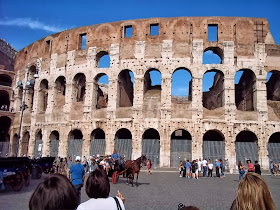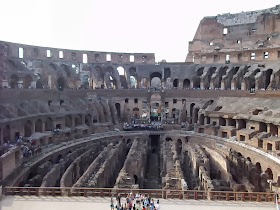 |
| Where it all started |
The key thing is that God had a crib. The Incarnation: Baby Jesus. The usual run of divinity, which is to pour itself out in self-gift and love, and this happened, this was, this is real, and it is Jesus. And the one who bears witness to it in a unique way that no one else can is the Blessed Virgin Mary.
 |
| The one who was there when it started |
I have to admit, though, that I was delighted to see this statue, which dates from after World War I. The house in which I live in Combermere is named Regina Pacis--Queen of Peace--and it was nice to see an image of her. Her hand is held up in a gesture of arrest, imploring us to stop the insanity of violence and killing; Jesus is holding an olive branch, hesitating before dropping it into the mouth of the waiting dove, waiting to see which nation of the world truly desires peace. The statue has lost none of its poignancy and relevance in the ensuing century since it was erected. Alas.
Besides St. Mary Major we also went here:
Just in case it's not intuitively obvious, this is the tomb of St. Paul, in the basilica of St. Paul outside the walls. My previous reading suggests that this is, in fact, the place - not a legend, but a historically well-attested site.
Personally, I found it incredibly moving to be in the presence of the relics of this saint who is virtually at the beginning of our Christian religion. The oldest Christian writings are Pauline; he is the first theologian and first missionary. If it is the usual run of divinity to pour itself out in love and self-gift, then St. Paul in his preaching, his writing, and his martyrdom shows that the divine life truly has been given to men redeemed in Christ.
Finally, although it was actually the first event of the day, we saw this guy:
 |
| Pictured: Oh, you know who. |
I suppose my dominant sense in all this is precisely that the life of God has been shared with humanity, that it extends back to the remote past of Bethlehem and Palestine and forward into the squares and streets of Rome and every city and country place of the world--wherever there is love, gift, faith, joy, peace.
And that this is the true Eternal City, the place that cannot be dimmed or destroyed by death or time's ravages: the rough wood of the crib and the cross is more enduring than marble and stone buildings, and the 'marble and stone' of the Church rests on those rough bits of wood, on this woman who said yes to God, and on the countless men and women who like Paul have carried the word of God in their flesh into the world, or it does not stand at all.
Today, we go to some little church called St. Peter's... we'll see what that's about later.


